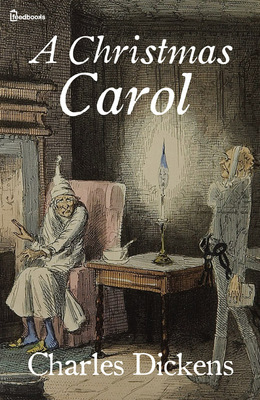A Ghost Story Of Christmas
In our culture of Christmas – patched together, hodge-podge, from centuries of celebration – A Christmas Carol holds an honored place, and it well deserves it. Few works of fiction have entered so exuberantly into the holiday, rejoicing in both its spirit and its pleasures. Charles Dickens saw, indeed, no conflict between the two, and as Scrooge’s cold greed and shut-up heart were expressed in his bleak Christmas Eve, so his reformation, the breaking open of his heart, overflowed into festivities on Christmas Day. The transformation of Ebenezer Scrooge is powerful and convincing, but so are Dickens’ descriptions of stuffed goose, pudding, and Norfolk apples.
It is interesting to me that this story – the most classic of all classic Christmas tales – is also a ghost  story. The full title is A Christmas Carol In Prose, Being A Ghost Story of Christmas. I would like to examine this element of A Christmas Carol, neatly summed up in that incongruous phrase A Ghost Story of Christmas.
story. The full title is A Christmas Carol In Prose, Being A Ghost Story of Christmas. I would like to examine this element of A Christmas Carol, neatly summed up in that incongruous phrase A Ghost Story of Christmas.
It is important to note, at the outset, that the only real ghost in A Christmas Carol is Jacob Marley. In our day, ‘ghost’ has been narrowed to mean the spirits of dead people that linger in our world, instead of moving on to the next one. In Dickens’ day, ‘ghost’ still had a general meaning of ‘spirit’, and the Ghosts of Christmas Past, Present, and Future are just that: spirits. Supernatural, certainly, and alarming perhaps, but not dead.
Jacob Marley was dead – a fact that the story begins with, and emphasizes through four paragraphs. “This must be distinctly understood, or nothing wonderful can come of the story I am going to relate.” Marley was a ghost, but a very particular kind of ghost – even an unusual kind.
A spiritual lawlessness prevails in the idea of ghosts – as if these souls have somehow evaded, or never had, an eternal destiny under the hand of God, as if they have managed to linger on in this world instead of going on to the next one. It is very interesting, then, that Marley’s Ghost clearly gives the impression that he (it?) is under law – a strict law, perhaps, but not a cruel or even unintelligible one.
“It is required of every man,” Marley tells Scrooge, “that the spirit within him should walk abroad among his fellowmen, and travel far and wide; and if that spirit goes not forth in life, it is condemned to do so after death.” Marley’s ghostly wanderings, far from being anarchic, are a judgment, the fulfillment of a law, and are obviously governed. “Nor can I tell you what I would,” he says to Scrooge. “A very little more, is all permitted to me.”
There are other glimpses, aside from this unseen power that requires and condemns and permits, of a larger, ordered spiritual world. When Scrooge pleads for comfort, Marley sadly rebuffs him: “I have none to give. It comes from other regions, Ebenezer Scrooge, and is conveyed by other ministers, to other kinds of men.”
Besides this sense of a justly ruled spiritual realm, in which ghosts like Marley wander in penance rather than rebellion, this ghost story is unusual in that it is not really about ghosts. The visit from Marley is absolutely crucial, and Dickens knows how to work it for thrills and chills: the foreshadowing of the door knocker and the hearse, which Scrooge can just manage to ignore; the inexplicably clanging bells, all through the empty house, and the dragging chains, beginning down in the cellar; the ghost’s “death-cold eyes”, and the awful detail of it removing the bandage around its jaw.
Yet the brief haunting that Scrooge suffers – and he does, indeed, suffer it – is a mercy, and ends with Marley declaring that Scrooge will not see him again. A Christmas Carol is about Ebenezer Scrooge’s salvation – his reclamation, the Ghost of Christmas Past calls it – and Marley’s Ghost simply has the task of getting his attention. The ghostly element of A Christmas Carol is deftly and powerfully used for the story’s real purpose, centered on something infinitely more important and interesting than any ghost – the soul of a living man.









































What a perfect post at Christmas on a blog dedicated to speculative fiction! Well-written and insightful analysis, Shannon. For years part of my Christmas tradition was to read Dickens’s original or see one of the many movies based upon it. And still I hadn’t thought through the difference between Marley’s ghost and the spirits of Christmas. Nicely done!
And Merry Christmas
Becky